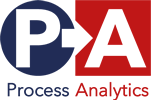Data science is the profession of the future, because organizations that are unable to use (big) data in a smart way will not survive. It is not sufficient to focus on data storage and data analysis. The data scientist also needs to relate data to process analysis. Process mining bridges the gap between traditional model-based process analysis (e.g., simulation and other business process management techniques) and data-centric analysis techniques such as machine learning and data mining. Process mining seeks the confrontation between event data (i.e., observed behavior) and process models (hand-made or discovered automatically). This technology has become available only recently, but it can be applied to any type of operational processes (organizations and systems). Example applications include: analyzing treatment processes in hospitals, improving customer service processes in a multinational, understanding the browsing behavior of customers using a booking site, analyzing failures of a baggage handling system, and improving the user interface of an X-ray machine. All of these applications have in common that dynamic behavior needs to be related to process models. Hence, we refer to this as “data science in action”.
The course covers the fundamentals of process mining. We start with data pre-processing and we show how through a visual inspection of event data and filtering, data can be pre-processed. In a second step, we consider the problem of process discovery, i.e. how to obtain a process model from an event log automatically. We again focus on the basics, but also show state-of-the-art in this area. To assess the quality of the discovered models, we show the fundamentals of conformance checking, i.e. the comparison of event logs and process models. We discuss the four main quality dimensions: fitness, precision, generalization and simplicity.
Finally, we show how the event log can be combined with the model to enrich the model with other perspectives, such as performance, decision points and resource information.
The course uses many examples using real-life event logs to illustrate the concepts and algorithms. After taking this course, one is able to run process mining projects and have a good understanding of the data science field.
Links
Staff
- Boudewijn van Dongen - Boudewijn’s research focusses on conformance checking. Conformance checking is considered to be anything where observed behavior, needs to be related to already modeled behavior. Conformance checking is embedded in the larger contexts of Business Process Management and Process Mining. Boudewijn aims to develop techniques and tools to analyze databases and logs of large-scale information systems Read More ...
- Eric Verbeek - Eric is the scientific programmer in the PA group. As such, he is the custodian of the process mining framework ProM. In you want access to the ProM repository, or have any questions related to ProM and its development, ask Eric. Recently, he has been working on a decomposition framework for both process discovery as Read More ...
- Dominique Sommers - Position: PhD Room: MF 7.117 Tel (internal): 8723 Links: Courses Presentations Projects Publications External links: Google scholar page Scopus page ORCID page DBLP page TU/e page Recent courses Recent presentations Recent projects Recent publications Recent awards
